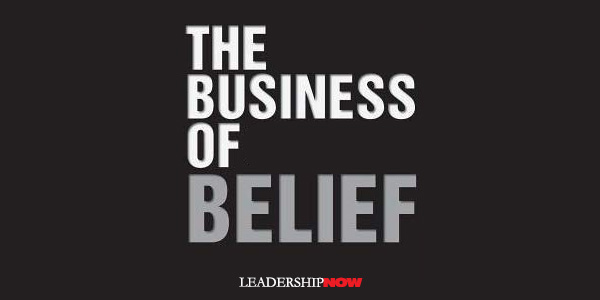 |
 |
07.24.13

The Business of Belief
"Belief has been a most powerful component of human nature that has somewhat been neglected," says Peter Halligan, a psychologist at Cardiff University. "But it has been capitalized on by marketing agents, politics and religion for the best part of two millennia."TOM ASACKER reveals the role of belief in leadership in The Business of Belief. For leaders and organization, belief is the issue. It is at the core of who we are, why we do what we do, or approach to change, and how we lead. "If you want to change the world, if you want to change your world, if you want to succeed at work, in the marketplace, or in any other social endeavor or organization, belief is your Holy Grail" writes Asacker. Beliefs are nothing more than working assumptions. Belief may or may not be true or even rational. But belief is at the heart of making your leadership work. We fight for choice and fight wars to protect choice, but we don't always live with choice, we more often live with our own self-imposed dogma. "Choice is liberating, and belief flourishes with the freedom to choose. But every choice also chains us, because it rejects a world brimming with competing opinions and possibilities. Our believing minds simply cannot function while brooding over all of those chains. The psychic strain would paralyze us. And so we ignore them." We want control over our world. And that desire impacts how we operate in the world. "If we believe we know what's happening around us, especially the near term future and general direction, we feel safe. That's why we resist change and want our agendas and ideologies to prevail." This is where, I believe leadership comes in. And Asacker addresses that in part two: Those skilled at motivating people to cross a new bridge to change their beliefs and behavior, are not trying to cajole or manipulate them against their will. Rather, they seek to guide them to a new destination, a transformed way of feeling, thinking and acting that's aligned with their personal desires and values. To paraphrase industrial designer Dieter Rams, good leaders "must have an intuition for the reality in which people live." It's one of the reasons that self-centered leaders struggle. Great leaders, as Asacker writes, must design new beliefs. "Creating belief is about affect before effect. It's about finding people who want to believe and making them feel comfortable." It's about making it ours. And this is key: "Making it ours is not giving us control of the ship. Rather, it's connecting the voyage—especially the questions, highlights and successes—to our desires and choices." That's leadership. In part three, Asacker turns to what we can do personally to understand and manage our own beliefs. He issues this challenge: Face it: We are either breaking out of our spirit-sucking routines and breaking through to new insights and experiences, or we are breaking down. So when the opportunity to step out of your comfort zone arrives, and it definitely will come, take it. Say no to the sure thing and say yes to a creative challenge. Say no to short-term, comfort producing activities, and say yes to fear, passion and leadership. I've only scratched the surface here. The Business of Belief is full of thought-provoking ideas and statements that will make you think. Perhaps I should say they will distract you. "Distractions and difficulties turn on our thinking mind, which undermines belief by overriding our instincts." May you be distracted.

Posted by Michael McKinney at 03:14 PM
|
BUILD YOUR KNOWLEDGE
 

How to Do Your Start-Up Right STRAIGHT TALK FOR START-UPS 
Grow Your Leadership Skills NEW AND UPCOMING LEADERSHIP BOOKS 
Leadership Minute BITE-SIZE CONCEPTS YOU CAN CHEW ON 
Classic Leadership Books BOOKS TO READ BEFORE YOU LEAD |